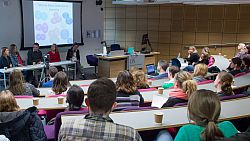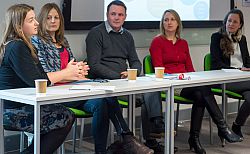Athena SWAN should facilitate real change, Sussex scientists agree
Athena SWAN should not be a box-ticking exercise but something that facilitates real change, concluded a panel of Sussex scientists at a debate this week.
 The LifeSci panel discussion and debate asking ‘Do we need Athena SWAN?’ coincided with International Women's Day
The LifeSci panel discussion and debate asking ‘Do we need Athena SWAN?’ coincided with International Women's Day
 L-R: Dr Erika Mancini; Dr Ruth Murrell-Lagnado; Prof Martin Gosling; Prof Michelle West; and panel chair Dr Tamsin Hinton-Smith
L-R: Dr Erika Mancini; Dr Ruth Murrell-Lagnado; Prof Martin Gosling; Prof Michelle West; and panel chair Dr Tamsin Hinton-Smith
The Athena SWAN charter recognises work in higher education to address gender equality. When it was first established in 2005 it focused on advancing the careers of women in science, technology, engineering, maths and medicine (STEMM).
And this week the School of Life Sciences at Sussex, which holds a departmental bronze Athena SWAN award in recognition of its actions to promote gender equality, posed the question, ‘Do we need Athena SWAN?’.
The well-attended panel discussion and debate coincided with International Women's Day on Tuesday (8 March) and was organised by Professor Louise Serpell, Chair of Athena SWAN for Life Sciences.
The lack of female professors in science was quickly pointed out by the four panel members, Professor Martin Gosling, Professor of Molecular Pharmacology (Biochemistry); Dr Erika Mancini, Senior Research Fellow in Biochemistry; Dr Ruth Murrell-Lagnado, Reader in Neuroscience; and Professor Michelle West, Professor of Tumour Virology (Biochemistry).
They said that solutions need to be found such as good childcare support and assistance with career re-entry. Practical help such as funding for a replacement lab manager during maternity leave or room availability for young children when key meetings are taking place would also make a difference.
Questions were asked about why women leave STEMM carers after working hard to get there and Dr Mancini commented that one young woman had asked her, "How is it possible to achieve a work-life balance?"
The panel agreed that attitudes do need to change on subjects such as part-time work. The significance of open access publishing was also raised and the fact that short-term contracts may put off young scientists.
There was a difference of opinion among the panel members on whether positive discrimination should be used, with Professor Gosling suggesting that "positive affirmation" is a better term and others arguing that women don't want favouritism. Dr Mancini replied that it is clear from the numbers that women are not getting any special treatment.
During the question-and-answer session one of the audience noted that in the US, it has been shown that legislation is needed to deliver change.
There was some suggestion that it may be too early to tell if Athena SWAN is really making a big difference at Sussex, while other panel members felt more positively that there are some signs of slow but steady improvement.
The debate – which was chaired and moderated by Dr Tamsin Hinton-Smith, Associate Director of the Centre for Gender Studies - ended with a promise to look into what real difference can be made with limited resources and where the real efforts to deliver change should be focussed.
